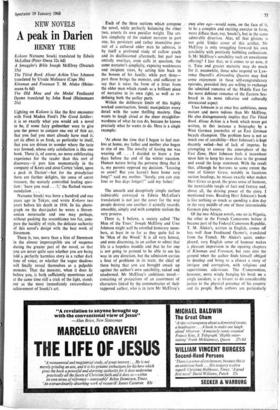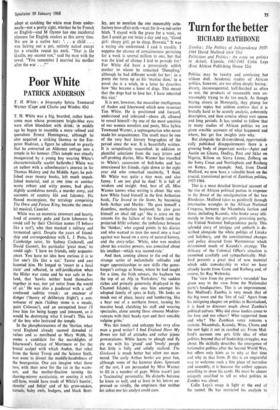NEW NOVELS
A peak in Darien
HENRY TUBE
A Smuggler's Bible Joseph McElroy (Deutsch 35s) The Third Book About Achim Uwe Johnson translated by Ursule Molinaro (Cape 30s) Kinsman and Foreman T. M. Aluko (Heine- mann 6s 6d) The Old Man and the Medal Ferdinand Oyono translated by John Reed (Heinemann 21s) Lighting on Kokoro is like the first encounter with Ford Madox Ford's The Good Soldier: it is so exactly what you would ask a novel to be, if some fairy godmother were to give you the power to conjure one out of thin air, that you feel you must already have read it; yet its effect is so fresh, so particular to itself, that you are driven to wonder where the taste was formed, whose only satisfaction is this one book. There is, of course, no more exhilarating experience for the reader than this sort- of discovery—it puts him momentarily in the company of Keats and stout Cortez 'silent, upon a peak in Darien'—but for the proselytiser there are further delights, the sense of secret treasure, the scarcely controlled leading ques- tion: 'have you read . . .?,' the flushed recom- mendation . . .
Natsume Soseki was born a hundred and one years ago in Tokyo, and wrote Kokoro two years before his death in 1916. In his photo- graph on the dust-jacket he wears a Steven- sonian moustache and one may perhaps, without pushing the resemblance too far, com- pare the lucidity of style, the delicate authority of this novel's design with the best work of Stevenson.
There is, too, more than a hint of Stevenson in the almost imperceptible use of suspense during the greater part of the novel, so that you are never quite sure whether you are being told a perfectly harmless story in a rather dark tone of voice, or whether the vague shadows will finally reveal themselves as a palpable monster. That the monster, when it does lie before you, is both sufficiently monstrous and at the same time still a trick of the light, stands out as the most immediately extraordinary achievement of Soseki's art. Each of the three sections %hien compose the novel, while perfectly balancing the other two, asserts its own peculiar weight. The art- less simplicity of the student narrator in part one, his persistent and rather insensitive pur- suit of a cultured older man he admires, is by itself a profound study of callow youth and its disillusioned aftermath; but part two entirely overlays, even calls in question, the same narrator's simplicity, exposing weaknesses and incipient vices, by setting him back in the bosom of his family; while part three— part three brings the monster, and sufficient to say that it takes the form of a letter from the older man which stands as a brilliant piece of narrative in its own right, as well as re- defining both the earlier parts.
Within the deliberate limits of this highly worked construction, Soseki manipulates every detail with the same thrilling mastery. One wants to laugh aloud at the sheer straightfor- wardness of what he can do, because he knows precisely what he wants to do. Here is a single example: 'At about the time that I began to feel rest- less at home, my father and mother also began to tire of me. The novelty of having me was wearing off. . . . I decided to leave a few days before the end of the winter vacation. Human nature being the perverse thing that it is, my parents opposed my decision. "Leaving so soon? But you haven't been home very long!" said my mother. "Surely, you can stay four or five days longer!" said my father.'
The smooth and deceptively simple surface (admirably conveyed in Edwin McLellan's translation) is not just the cover for the way people destroy one another; it actually records, smoothly, simply and with complete realism the very process.
There is, I believe, a society called 'The Men of the Trees.' Joseph McElroy and Uwe Johnson might well be enrolled honorary mem- bers, at least in so far as they quite fail to be 'Men of the Wood.' It is all very honest, and even disarming, in an author to admit that life is a hopeless muddle and that he for one is not going to pretend to be able to see his way in any direction, but the admission carries a host of problems in its train; the chief of these being that you are brought smack up against the author's own sensibility, naked and unadorned. Mr McElroy's ambitious novel— consisting of projections of an assortment of characters linked by the commentaries of their supposed author, who is in turn Mr McElroy's
own alter ego—would seem, on the face of it, to be a complex and exciting exercise in form, more diffuse than, say, Soseki's,but in the same admirable direction. Alas, all that glistens is not gold. Under cover of this artifice, Mr McElroy is only smuggling forward his own sensibility with positively bubbling enthusiasm. Is Mr McElroy's sensibility such an unwelcome offering? I fear that, as it comes to us now, it is. Time and greater maturity may do much for it; meanwhile, those who respond to Law- rence Durrell's Alexandria Quartet may find some enjoyment in these self-congratulatory episodes, provided they are willing to exchange the admitted romance of the Middle East for the more dubious romance of the Eastern Sea- board in its most talkative and culturally. intoxicated aspect.
Uwe Johnson is at once less ambitious, more mature and more tedious than Mr McElroy. He also disingenuously implies that The Third Book About Achim is a book which never got written, in this instance a biography by a West German journalist of an East German bicycle champion. The problem here is not so much one of sensibility—Herr Johnson's is kept decently veiled—but of lack of impetus. In attempting to convey the atmosphere of the East Zone, Herr Johnson feels it incumbent upon him to keep his nose close to the ground and avoid the large statement. With the result that, although he borrows to some extent the tone of Canter Grass, notably in facetious section headings, he misses exactly what makes Herr Grass so good, the gross sense of humour, the inextricable tangle of fact and fantasy and, above all, the driving power of the story. I mentioned trees. Reading Herr Johnson's book is like nothing so much as spending a dim day in the very middle of one of those interminable German pine forests.
Of the two African novels, one set in Nigeria, the other in the French Cameroons before it became part of the Federal Cameroon Republic, T. M. Aluko's, written in English, comes off less well than Ferdinand Oyono's, translated from the French. Mr Aluko's quiet, under- played, very English sense of humour makes a pleasant impression in the opening chapters of Kinsman and Foreman, but runs into the ground when the author finds himself obliged to develop and bring to a climax a story of intrigue and corruption, with religious and superstitious side-issues. The Cameroonian, however, more wisely hanging his book on a single incident, is at leisure to do considerable justice to the physical presence of his country and its people. Both authors are particularly adept at catching the white man from under- neath—not a pretty sight, whether he be French or English—and M Oyono has one incidental pleasure for English readers at this sorry time.
We are in a native hut: . . a child . . . was licking out a pot, entirely naked except for a crucifix round his neck. "That is De Gaulle, my second son," said the man with the towel. "You remember I married his mother after the war . . ."



































 Previous page
Previous page